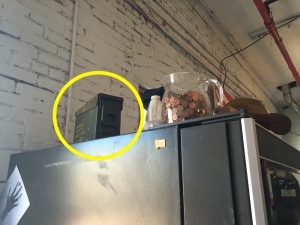E-Waste and Doomcart
Batteries
[edit | edit source]
Alkaline batteries can be thrown in the trash.
All other batteries should be placed in the ammo case on top of the vending machine. NYC requires that you do the following before disposing of batteries at their disposal sites:
- place clear (not opaque) tape over the contacts
- individually bag the batteries
Place large batteries near the e-waste bin.
Doomcart System
[edit | edit source]If something is in the way, but you don't know if it's trash, please place it on the DOOMCART in the TOP BIN. It is also nice to send a post to the list about what you put in there so if someone wants it they know to retrieve it.
Each week (or when the doomcart is addressed) dispose of the items in the bin on the lowest tier of the doomcart, then shift the bins down and put the now empty bin on the top tier. This way everything gets at least three weeks before we toss it.
If you want something on the doomcart: mention it on the list in case it belongs to someone, and then go take it -- and then put it in your personal space (put it in your locker or take it home).
Hazardous Material Disposal
[edit | edit source]The official NYC guide is here: https://www1.nyc.gov/assets/dsny/site/services/harmful-products
Recycling
[edit | edit source]NYC Recycling Guide.
Source: https://www1.nyc.gov/assets/dsny/site/services/recycling/what-to-recycle
Please empty and rinse metal, glass, plastic and cartons containing food before recycling.
Metal (all kinds)
[edit | edit source]- metal cans (soup, pet food, empty aerosol cans, empty paint cans, etc.)
- aluminum foil and foil products (wrap and trays)
- metal caps and lids
- household metal items (wire hangers, pots, tools, curtain rods, small appliances that are mostly metal, certain vehicle license plates, etc.)
- bulky metal items (large metal items, such as furniture, cabinets, large mostly metal appliances, DOES NOT INCLUDE electronic devices banned from disposal)
Glass
[edit | edit source]- glass bottles and jars ONLY
- Plastic (rigid plastics)
- plastic bottles, jugs, and jars
- rigid plastic caps and lids
- rigid plastic food containers (yogurt, deli, hummus, dairy tubs, cookie tray inserts, “clamshell” containers, other rigid plastic take-out containers)
- rigid plastic non-food containers (such as “blister-pack” and “clamshell” consumer packaging, acetate boxes)
- rigid plastic housewares (flower pots, mixing bowls, plastic appliances, etc.)
- bulk rigid plastic (crates, buckets, pails, furniture, large toys, large appliances, etc.)
- Note: Rigid plastic is any item that is mostly plastic resin—it is relatively inflexible and maintains its shape or form when bent.
Cartons
[edit | edit source]- Food and beverage cartons
- Drink boxes
- Aseptic packaging (holds beverages and food: juice, milk and non-dairy milk products, soup, etc.)
- Paper
- newspapers, magazines, catalogs, phone books, mixed paper
- white and colored paper (lined, copier, computer; staples are ok)
- mail and envelopes (any color; window envelopes are ok)
- receipts
- paper bags (handles ok)
- wrapping paper
- soft-cover books (phone books, paperbacks, comics, etc.; no spiral bindings) (schools should follow their school book recycling procedures)
Cardboard
[edit | edit source]- cardboard egg cartons
- cardboard trays
- smooth cardboard (food and shoe boxes, tubes, file folders, cardboard from product packaging)
- pizza boxes (remove and discard soiled liner; recycle little plastic supporter with rigid plastics)
- paper cups (waxy lining ok if cups are empty and clean; recycle plastic lids with rigid plastics)
- corrugated cardboard boxes (flattened and tied together with sturdy twine)
Not Accepted
[edit | edit source]- Paper with heavy wax or plastic coating (candy wrappers, take-out and freezer containers, etc.)
- Soiled or soft paper (napkins, paper towels, tissues)
- Hardcover books (schools should follow their school book recycling procedures)
- Batteries
- Electronic devices banned from disposal
- Printer cartridges
- Glass items other than glass bottles and jars (such as mirrors, light bulbs, ceramics, and glassware)
- Window blinds
- Foam plastic items (such as foam food service containers, cups and trays, foam protective packing blocks, and, and foam packing peanuts)
- Flexible plastic items (such as single-serve food and drink squeezable pouches and tubes such as toothpaste, lotion, cosmetics, or sports balls such as basketballs, bowling balls, soccer balls, footballs, yoga balls)
- Film plastic (such as plastic shopping bags and wrappers.) Bring plastic bags and film to participating stores for recycling
- Cigarette lighters and butane gas lighters
- Cassette and VHS tapes
- Pens and markers
- “Tanglers” (such as cables, wires, cords, hoses)
- Rigid plastic containers containing medical “sharps” or disposable razors
- Containers that held dangerous or corrosive chemicals